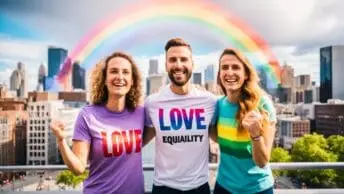Imagine a world where LGBTQ+ equality leads to a better society for everyone. The largest national LGBT survey, with over 108,000 participants, shows big challenges remain. Many still fear holding hands with their same-sex partner in public. This, along with the harmful practice of conversion therapy in the UK, shows we need urgent policy changes.
The European Union stands for unity in diversity, making equality and non-discrimination key. However, a 2019 survey showed an increase in LGBTQ+ discrimination across the EU. Responding to this, the European Commission launched the LGBTIQ Equality Strategy 2020-2025. Its goal? To weave LGBTQ+ equality into all policies and work closely with Member States to fight discrimination effectively by 2025.
In the UK, progress is visible, with the Government Equalities Office investing £4.5 million in an ‘LGBT Implementation Fund.’ This is part of a bigger plan with over 75 actions to better LGBTQ+ lives. Despite these efforts, there’s still a long way to go. Making public spaces, healthcare, education, and workplaces safe and inclusive for LGBTQ+ folks is essential for a brighter future.
Introduction: Understanding the Need for Policy Advocacy
In the EU, efforts like the “List of Actions to Advance LGBTI Equality” aim to create fairer societies. But, LGBTQ+ people still face discrimination and feel unsafe. So, the European Commission’s LGBTIQ Equality Strategy marks a new chapter. It aims to ensure LGBTQ+ equality in all policies and boost minority voices.
The SARA Project found three main steps leading to policy changes: spotting problems, brainstorming solutions, and advocacy. Advocacy is crucial for gaining social acceptance and changing policies to support rights and freedoms. The SARA/AED Guide teaches effective advocacy to those working in NGOs, research, and management.
Policy advocacy isn’t just for official settings; it works in informal ones too. In Kenya, advocates pushed for better adolescent health policies regarding HIV/AIDS and reproductive issues. The formation of KAPAH helped with training, building alliances, and sharing vital information. This shows how advocacy can get funding, promote laws, and highlight important health issues.
The Global Road Safety Partnership has worked with others to create a guide on running advocacy campaigns. Supported by Bloomberg Philanthropies, it talks about researching, setting goals, building partnerships, and knowing the political scene. Advocacy needs clear, strong messages to win over policymakers, use media smartly, and get grassroots support.
It’s important to keep track of how advocacy campaigns are doing, though this is often forgotten. Celebrating achievements helps keep everyone motivated. Planning carefully and staying flexible as things change is essential for success.
Nonprofits play a big role in influencing policies on social, economic, and environmental issues. Advocacy boosts their stability, helps them stick to their goals, and encourages teamwork. It also lets them protect their aims, overcome challenges, and support fairness by fighting discrimination and including those affected.
Knowing the difference between advocacy and lobbying is key for nonprofits to keep their tax-free status. They need to follow certain laws, like the Internal Revenue Code in the US. This way, they can continue their work, speak up for their supporters, and push for positive changes towards LGBTQ+ equality and acceptance.
Health and Wellbeing: Addressing Inequalities in Healthcare
The UK has named a national adviser for transgender health. This major step forward helps tackle inequalities in healthcare for the LGBTQ+ community. It ensures that the unique health needs of this group are acknowledged and met.
Recent data shows a huge 19-year difference in how long people live healthily in England, based on where they live. Those from poorer areas and some ethnic minorities face more health problems earlier in life.
Many factors like wealth, where you live, and more can affect your health. The law aims to address these unfair gaps, aiming for everyone to have equal chances at being healthy.
“Inclusion health” now focuses on helping those who are often ignored, face prejudice, or are missed in health studies. During the COVID-19 pandemic, the poorest areas saw death rates 1.8 times higher. People of Pakistani and Bangladeshi heritage were also at greater risk.
There’s a goal to catch 75% of cancers early, by stage 1 or 2, by 2028. This, along with new guidelines and standards, seeks to improve how long and well we live. Improvements in gender identity services for adults in England aim to better serve the LGBTQ+ community, making healthcare accessible for all.
Education: Creating Inclusive Learning Environments
The UK aims to make schools more welcoming for everyone. It’s doing this by fighting discrimination based on sexual orientation and identity. New subjects on relationships and sex education (RSE) help young people understand diversity better, getting them ready for life ahead.
For education to be truly inclusive, specific goals and measures need implementation. Leaders play a huge part in this, by crafting and executing LGBTQ+ friendly policies. This approach helps every child attend mainstream classes, no matter their background.

Inclusive education improves social and learning results for all students. The UNESCO Guide highlights the need for fair education systems. These systems must have strong principles, policy priorities, and backing strategies. Regular checks are essential to keep these efforts effective.
Combating hidden bias and racism is key to closing the ethnicity gap in universities, says Agarwal (2020). Classroom stereotypes can wrongly shape how students are seen (Steele, 2010). Not feeling accepted at school may cause stress and lower learning ability (Agarwal, 2020).
Listening well and understanding others are crucial when dealing with racism and bias, according to Campt (2018). Holley and Steiner (2005), Jackson (2014), and others suggest establishing common ground rules. These include speaking respectfully, taking turns, and focusing on ideas not people.
Stopping anti-LGBTQ+ bullying means teaching staff about equality and bias (Harven & Soodjinda, 2016). Skills rooted in kindness (Gilbert, 2017) help build empathy. Tools like EDI cards by Jarvis and Clark (2020) encourage conversations on equality, whether online or face-to-face.
Policy Changes to Combat Discrimination in the Workplace
The UK aims to make workspaces free from discrimination. This is especially for LGBTQ+ staff. The Equality Act 2010 requires bosses to act against discrimination. They need to ensure all workers feel included.
Workplaces with diversity and inclusion are better for everyone. Employers need to regularly check their policies are working. They should look at who they employ, ask employees for their thoughts, and ensure pay is fair. Supporting LGBT+ groups and offering training are good steps too.
The Acas Code of Practice tells employers how to properly handle discrimination complaints. Training managers and supporting employees’ careers with mentoring are key. This helps everyone understand the importance of equality.
Seeing more complaints might mean people feel safer to report discrimination. It’s important to deal with any form of unfair treatment properly. Protecting the rights of LGBTQ+ employees is crucial. This means stopping harmful practices and responding well to hate crimes.
It’s the duty of employers to have clear policies on equality. They must train staff on stopping discrimination. Special protection is there for workers changing their gender, ensuring they’re treated fairly. Confidential handling of gender information is a must for employers.
Legal Framework: Strengthening Rights and Protections
The UK has recognized the need to update how transgender people are recognized. The Gender Recognition Act 2004 is not meeting their needs, so there are plans to change it. The goal is to make it easier for transgender people, while keeping their dignity in mind. It’s also important to make sure LGBTQ+ people have legal protections, and these changes should help with that.
The Human Rights Act 1998 is key in the UK. It makes sure public authorities respect human rights. By including the European Convention on Human Rights (ECHR) in UK law, it shows how crucial human rights are. Everyone deserves protection, from the right to live without torture to being treated fairly in court.
A guide in November 2014 shared stories from England, Wales, Northern Ireland, and Scotland. It showed how regulators and others work to protect human rights. The UK is serious about LGBTQ+ rights, covering both civil and political rights. This is shown in laws like the Mental Health Act 1983 and the Police and Criminal Evidence Act 1984.
The UK is working to be better on human rights by following international treaties. The changes to the Gender Recognition Act are part of this. It’s a step towards better protection for LGBTQ+ people, making society more welcoming. The UK wants to fight discrimination and respect everyone’s dignity.
Safety: Enhancing Protection Against Hate Crimes
Making sure LGBTQ+ individuals are safe is very important in the UK. The government has a detailed plan to fight hate crimes. Based on the 2016 action plan, it covers efforts up to 2020. These include stopping hate crimes, better protecting people, and helping those affected.

The plan focuses on answering hate crimes quickly, increasing the number of reports, and understanding why these crimes happen. Reports from the Crown Prosecution Service give critical info on how often these crimes occur and the success in prosecuting them. This method helps protect the public by making sure actions are taken transparently.
The government has made commitments to raise the penalty for hate crimes and to start campaigns that encourage people to report these crimes. There is a focus on working together, both in the UK and worldwide. This includes the legal system, schools, and health services all doing their part. Regular checks and feedback help make sure the strategy works well.
Plans to stop conversion therapy are being discussed. This is part of the effort to cut down on hate crimes. The police files on hate crimes are also reviewed to make sure they’re accurate. The ultimate goal is to bring justice to victims and make the public trust the protection measures in place.
Public Representation: Increasing LGBTQ+ Visibility and Voice
LGBTQ+ representation in media is vital. In 2019, kids aged 3-4 watched an average of 12.7 hours of TV a week. Those between 3-17 years spent up to 46.1 hours in front of the screen every week. The media shapes views and promotes inclusivity with these high viewing figures.
Since 2005, GLAAD reports show more LGBTQ+ figures in media. This has led to more visibility and diverse stories. “Heartstopper,” “Schitt’s Creek,” “The Owl House,” and “Julian is a Mermaid” are praised for their genuine LGBTQ+ narratives. These stories offer role models and help in accepting LGBTQ+ people in society.
Action for Children has worked to better media representation, with figures like Dr. Ranj supporting. Yet, the need for more diverse LGBTQ+ stories in media remains to make it truly inclusive.
The growth of LGBTQ+ media stories began in the 1990s. Events like Ellen DeGeneres coming out and shows like “Will and Grace,” and “Modern Family” marked milestones. They played key roles in changing how people see LGBTQ+ lives and increasing visibility internationally.
Studies show that more media and freedom of press lead to youth being more open towards LGBTQ+ people. Open media is vital for LGBTQ+ rights. Promoting varied stories can build a more accepting world for LGBTQ+ individuals.
International Perspectives: Learning from Global Best Practices
The UK’s Foreign, Commonwealth & Development Office plays a big role in LGBTQ+ rights globally. By supporting worldwide equality campaigns, they work to stop LGBT+ discrimination and support human rights for all. Some nations have started focusing on including more children in early years education, aiming to help specific groups do better.
This matches the UK’s global goal of enhancing LGBT+ people’s rights. Though staff shortages are a hurdle, prioritizing communication and emotional skills from a young age is key. It creates a strong educational base. Play is seen as crucial for comprehensive learning.
School inspections in different countries often miss looking deeply into education quality. They tend to focus on other aspects, reducing the impact of these global efforts. Yet, studies confirm that high-quality early education boosts cognitive and social skills. This is particularly true for children from less wealthy backgrounds.
The UK actively champions LGBTQ+ rights laws and social acceptance worldwide. Through ongoing support and funding for equality drives, it aims to build a wider culture of inclusion. It helps fight against LGBT+ discrimination globally.
Conclusion
The UK’s effort to boost equal rights for the LGBTQ+ community is strong. By using smart strategies, they are making policies simpler to handle. These steps are helping to build a future where everyone feels included.
Even though changes in policy are usually small, they add up over time. Big changes often come after major events in society. But, every step forward helps to fight discrimination and supports equality.
Studies show that lasting changes need lots of small steps. The UK is using ideas from different theories to make sure they keep moving forward. Anke Hassel and Kai Wegrich’s book talks about the changes needed for LGBTQ+ equality. Their book, from March 2022 and found at Oxford University Press, says both big and small changes are important.
The UK is leading the way in fighting for equality. They use different ways to share information, like IP access or library cards. This helps everyone get the info they need. Libraries and schools play a big part in making sure more people can learn about these policies.
This approach shows the UK is serious about making life better for the LGBTQ+ community. It’s a promise to keep pushing for a world where everyone is treated equally.1>






